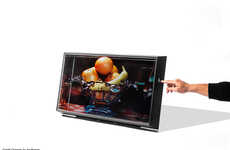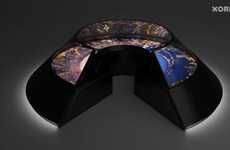
The Max Planck Insititute's 'Holograms for Acoustics' Create 3D Images
When people think of holograms, they often think of the systems from science fiction franchises like 'Star Wars' and 'Star Trek' that use light to create 3D images, however researchers from the Max Planck Institute have managed to achieve the same effect using sound. The Max Planck researchers' 'Holograms for Acoustics' use highly focused sound waves to manipulate fluids and create discernible images for as long as the sounds last.
The technique involves using a transducer to direct pulses of sound at a thin layer of water, causing the water to be agitated and form shapes. Using their method, the Max Planck researchers were able to make the water into the shape of a dove, cause a droplet of water to levitate, and propel paper boats along the surface of the water.
The technique involves using a transducer to direct pulses of sound at a thin layer of water, causing the water to be agitated and form shapes. Using their method, the Max Planck researchers were able to make the water into the shape of a dove, cause a droplet of water to levitate, and propel paper boats along the surface of the water.
Trend Themes
1. Sound-based Holography - Expanding on the concept of holography, researchers are using sound waves to create 3D images, opening up new possibilities for immersive experiences and interactive displays.
2. Manipulating Fluids with Sound - The use of highly focused sound waves to shape and manipulate fluids presents disruptive innovation opportunities in industries such as medical imaging, material science, and entertainment.
3. Sound-induced Levitation and Propulsion - Harnessing the power of sound to levitate objects and propel them in controlled ways has potential applications in fields including manufacturing, transportation, and robotics.
Industry Implications
1. Medical Imaging - The ability to manipulate fluids using sound waves can enable advancements in ultrasound technology and improve diagnostic capabilities in the medical imaging industry.
2. Material Science - Sound-based manipulation of fluids offers opportunities for precise control of material properties, revolutionizing fields such as additive manufacturing, microfluidics, and chemical synthesis.
3. Entertainment - The development of sound-based holography opens up possibilities for immersive experiences and interactive displays, transforming the entertainment industry with new forms of visual storytelling.
4.8
Score
Popularity
Activity
Freshness























